Related Research Articles

Ze'ev Jabotinsky was a Revisionist Zionist leader, author, poet, orator, soldier, and founder of the Jewish Self-Defense Organization in Odessa.

The Young Turks was a constitutionalist broad opposition movement in the late Ottoman Empire against Sultan Abdul Hamid II's absolutist regime. The most powerful organization of the movement, and the most conflated, was the Committee of Union and Progress (CUP), though its goals, strategies, and membership continuously morphed throughout Abdul Hamid's reign. By the 1890s, the Young Turks were mainly a loose and contentious network of intelligentsia exiled in Western Europe and Egypt that made a living by selling their newspapers to secret subscribers.

The 1920 Nebi Musa riots or 1920 Jerusalem riots took place in British-controlled part of Occupied Enemy Territory Administration between Sunday, 4 April, and Wednesday, 7 April 1920 in and around the Old City of Jerusalem. Five Jews were killed and several hundred injured; four Arabs were killed, and eighteen injured; 7 Britons were injured. The riots coincided with and are named after the Nebi Musa festival, which was held every year on Easter Sunday, and followed rising tensions in Arab–Jewish relations. The events came shortly after the Battle of Tel Hai and the increasing pressure on Arab nationalists in Syria in the course of the Franco-Syrian War.
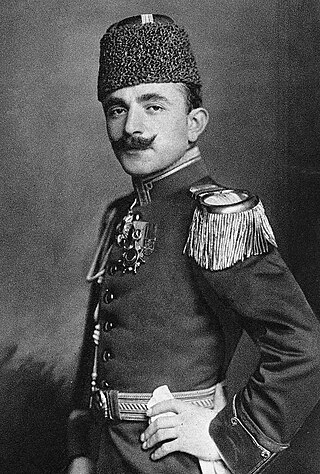
İsmail Enver, better known as Enver Pasha, was an Ottoman military officer, revolutionary, and convicted war criminal who formed one-third of the dictatorial triumvirate known as the "Three Pashas" in the Ottoman Empire.
Hatzohar, full name Brit HaTzionim HaRevizionistim, was a Revisionist Zionist organization and political party in Mandatory Palestine and newly independent Israel.
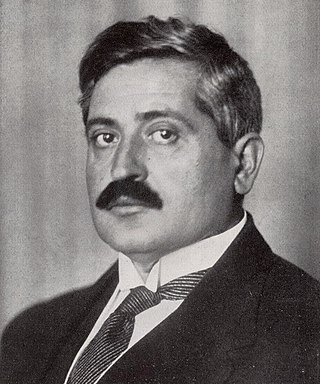
Mehmed Talaat, commonly known as Talaat Pasha or Talat Pasha, was an Ottoman Young Turk activist, politician, and convicted war criminal who served as the de facto leader of the Ottoman Empire from 1913 to 1918. He was chairman of the Union and Progress Party, which operated a one-party dictatorship in the Empire; during World War I he became Grand Vizier. He has been called the architect of the Armenian genocide, and was responsible for other ethnic cleansings during his time as Minister of Interior Affairs.
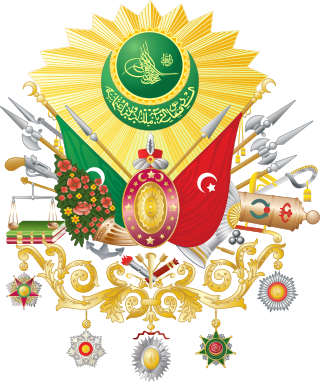
The dissolution of the Ottoman Empire (1908–1922) was a period of history of the Ottoman Empire beginning with the Young Turk Revolution and ultimately ending with the empire's dissolution and the founding of the modern state of Turkey.

The Young Turk Revolution was a constitutionalist revolution in the Ottoman Empire. Revolutionaries belonging to the Internal Committee of Union and Progress, an organization of the Young Turks movement, forced Sultan Abdul Hamid II to restore the Constitution, recall the parliament, and schedule an election. Thus began the Second Constitutional Era.

The Second Constitutional Era was the period of restored parliamentary rule in the Ottoman Empire between the 1908 Young Turk Revolution and the 1920 dissolution of the General Assembly, during the empire's twilight years.

The 1913 Ottoman coup d'état, also known as the Raid on the Sublime Porte, was a coup d'état carried out in the Ottoman Empire by a number of Committee of Union and Progress (CUP) members led by Ismail Enver Bey and Mehmed Talaat Bey, in which the group made a surprise raid on the central Ottoman government buildings, the Sublime Porte. During the coup, the Minister of War, Nazım Pasha, was assassinated and the Grand Vizier, Kâmil Pasha, was forced to resign. Soon after the coup, the government fell into the hands of the CUP, now under the leadership of the triumvirate known as the "Three Pashas", made up of Enver, Talaat, and Cemal Pasha.

Ahmed Rıza was an Ottoman educator, activist, revolutionary, intellectual, politician, polymath, and a prominent member of the Young Turks. He was also a key early leader of the Committee of Union and Progress.
Prior to and during World War I, the area of Palestine was controlled by the Ottoman Empire. The Ottoman regime, since late 19th century, imposed many harsh demands on the Yishuv, and was ended in 1918 when Britain occupied the territory, followed by the establishment of the British Mandate in 1922.
Mehmet Cavit Bey, Mehmed Cavid Bey or Mehmed Djavid Bey was an Ottoman economist, newspaper editor and leading politician during the dissolution period of the Ottoman Empire. As a Young Turk and a member of the Committee of Union and Progress (CUP) had positions in government after the constitution was re-established. In the beginning of the Republican period, he was controversially executed for his alleged involvement in an assassination attempt against Mustafa Kemal Atatürk.
Hamevasser was a Zionist Hebrew-language weekly newspaper published from Constantinople 1909-1911. As the number of Hebrew literates was limited at the time, the circle of readership of the newspaper was rather limited. However, the publication of the newspaper contributed to enhancing the status of Hebrew in the Jewish community. Hamevasser was distributed in various parts of the Ottoman empire and beyond, reaching Greece, Bulgaria, Tunisia and Morocco. Hamevasser was produced by a small circle of Zionist journalists, and was edited by S. Hochberg.
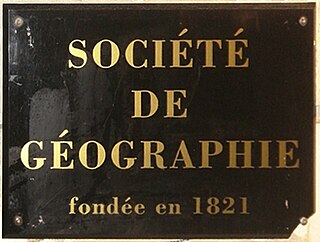
The Arab Congress of 1913 met in a hall of the French Geographical Society at 184 Boulevard Saint-Germain, Paris from June 18–23 in Paris to discuss more autonomy for the Arab people living under the Ottoman Empire. Furthermore The Arab National Congress, which was established by 25 official Arab Nationalists delegates, was convened to discuss desired reforms and to express their discontent with some Ottoman policies. It took place at a time of uncertainty and change in the Ottoman Empire: in the years leading up to World War I, the Empire had undergone a revolution (1908) and a coup (1913) by the Young Turks, and had been defeated in two wars against Italy and the Balkan states. The Arabs were agitating for more rights under the fading empire and early glimmers of Arab nationalism were emerging. A number of dissenting and reform-oriented groups formed in Greater Syria, Palestine, Constantinople, and Egypt. Under Zionist influence, Jewish immigration to Palestine was increasing, and England and France were expressing interest in the region, competing for spheres of influence.

By the time the Ottoman Empire rose to power in the 14th and 15th centuries, there had been Jewish communities established throughout the region. The Ottoman Empire lasted from the early 12th century until the end of World War I and covered parts of Southeastern Europe, Anatolia, and much of the Middle East. The experience of Jews in the Ottoman Empire is particularly significant because the region "provided a principal place of refuge for Jews driven out of Western Europe by massacres and persecution."

The Committee of Union and Progress, was a revolutionary group and political party active between 1889 and 1926 in the Ottoman Empire and the Republic of Turkey. The foremost faction of the Young Turks, the CUP instigated the 1908 Young Turk Revolution, which ended absolute monarchy and began the Second Constitutional Era. After an ideological transformation, from 1913 to 1918, the CUP ruled the empire as a dictatorship and committed genocides against the Armenian, Greek, and Assyrian peoples as part of a broader policy of ethnic erasure during the late Ottoman period. The CUP and its members have often been referred to as Young Turks, although the movement produced other political parties as well. Within the Ottoman Empire its members were known as İttihadcılar ('Unionists') or Komiteciler ('Committeemen').
L'Aurore was a French language publication which was launched by a Thessaloniki-born Jewish journalist Lucien Sciuto in Istanbul in 1909 and published there until 1923. Sciutto restarted L'Aurore as weekly magazine in Cairo in 1924 which appeared until 1941.
Lucien Sciuto (1868–1947) was a Jewish educator, writer and journalist. Born in Thessaloniki, Ottoman Empire, he worked for various publications in Istanbul and founded a magazine-turned-newspaper L'Aurore which was published in Istanbul and then, in Cairo between 1909 and 1941 with five-year hiatus.
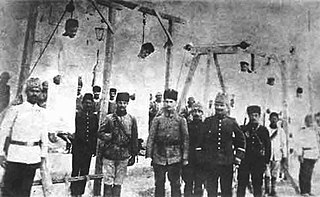
Abdul Hamid al-Zahrawi was a Syrian Arab nationalist and former member of the General Assembly of the Ottoman Empire. A journalist with the Arab newspaper Al Qabas he supported the Committee of Union and Progress (CUP), a Young Turks movement that carried out a successful coup in 1908. Zahrawi sat for the CUP in parliament but turned against them when they started replacing Arab officials with Turks and was replaced in a rigged election in 1912.
References
- ↑ Yüksel, Ahmet (2020). "Sami Hochberg: A Zionist Journalist Author Printer Diplomat Spy". History Studies: International Journal of History. 12 (4): 2263–2297. doi: 10.9737/hist.2020.920 .
- ↑ Lewental, D. Gershon (2010). "Le Jeune Turc". Encyclopedia of the Jews in the Islamic World.
- ↑ Mandel, Neville (1965). "Attempts at an Arab‐Zionist entente: 1913–1914". Middle Eastern Studies. 1 (3): 238–267. doi:10.1080/00263206508700015.
- ↑ Ozavci, Ozan (2020). "A Jewish "Liberal" in Istanbul: Vladimir Jabotinsky, the Young Turks and the Zionist Press Network, 1908–1911". Jews, Liberalism, Antisemitism: A Global History. Springer International Publishing. pp. 289–314. ISBN 978-3-030-48240-4.
- ↑ Kieser, Hans-Lukas (2018). Talaat Pasha: Father of Modern Turkey, Architect of Genocide . Princeton University Press. p. 180. ISBN 978-1-4008-8963-1.
The Ottoman press covered Talaat's multiple denials of any wrongdoing by the central government in May and June 1914. After the discussion on 6 July, it attacked Emmanuil Emmanuilidis to undermine his credibility; the newspaper Le Jeune- Turc, in particular, excelled in doing so.171 Comparatively rich in topics, this Istanbul- based, Zionist- sponsored newspaper was devotedly pro-CUP and flattered "His Excellency Talaat Bey" almost daily.
- 1 2 Murat Cihan Yıldız (2015). Strengthening Male Bodies and Building Robust Communities: Physical Culture in the Late Ottoman Empire (PhD thesis). University of California, Los Angeles. p. 157. Archived from the original on 13 April 2021.
- ↑ Sarah Abrevaya Stein (2002). "Ottomanism in Ladino" (Working Paper). European University Institute. p. 17. Retrieved 19 February 2022.